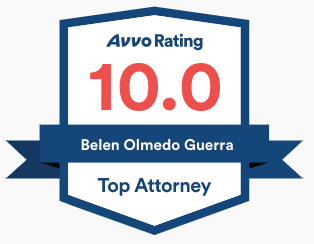First-degree homicide is the most severe of any murder charge. Due to this, those convicted of first-degree homicide generally receive the harshest penalties of any other crime. Sentencing varies from state to state but ultimately relies on the facts of the case and the ability of your defense lawyer. In Arizona, a murder conviction often brings several years imprisonment and hefty fines. It can also result in the death penalty.
Because of the severe consequences of first-degree homicide, it is important to obtain the services of an experienced criminal defense lawyer. Having strong representation from a Phoenix homicide defense attorney like Belén Olmedo Guerra can be the difference between life and death, literally. If you’re facing charges for homicide in Arizona or any other crime that resulted in the death of another individual, reach out to Belén today.
What is first degree homicide?
Homicide, sometimes interchangeable with murder in Arizona, is the illegal act of taking another person’s life without proper justification. This also applies to the life of a fetus with the intention to harm or kill. In the state of Arizona, there are a few different types of charges a person may receive for killing someone. In order of severity, these are:
- First-degree homicide
- Second-degree homicide
- Vehicular homicide
- Vehicular manslaughter
- Manslaughter
- Negligent homicide
The charge assigned depends on the facts surrounding the case and what led to the victim’s death. The type of charge you receive determines what punishment you will end up with. For example, a manslaughter charge would result in much less of a sentence than a first-degree murder charge would. (See our blog: What is the Difference Between Involuntary Manslaughter and Negligent Homicide in Phoenix, AZ?)
In most states, to be a first-degree homicide, the crime must have met three basic elements. These are (1) intent to kill, (2) deliberation, and (3) premeditation. Federal law and some states, including Arizona, also require that “malice aforethought” be a factor. This is essentially the same as premeditation and simply means that the defendant carried out the act with malicious intent. He or she either planned the murder before committing it or was “lying in wait” for the victim beforehand.
This means that any type of accidental death would not result in a first-degree homicide charge. However, this doesn’t apply if the defendant meant to kill one person but ended up killing another on accident. The intent to kill was still there, despite the victim being accidental. Thus, the perpetrator would still receive a first-degree homicide charge under ARS 13-1105.
What’s the difference between first and second-degree homicide?
The difference between first and second-degree homicide is the intent or mindset of the perpetrator at the death’s occurrence. First-degree homicide means that the person that carried out the crime intentionally killed the other person. In other words, it was a predetermined act. This is the more serious of the two, as taking the time to plan another individual’s death is arguably a more serious crime than the alternative.
A second-degree homicide charge (ARS 13-1104) requires that the murder wasn’t premeditated. Instead, the defendant displayed reckless conduct and an obvious lack of concern for human life. It means that the killing was inherently dangerous, reckless, and occurred in the spur of the moment.
Three of the 50 states have charges that increase another degree: third-degree murder. These states are Florida, Minnesota, and Pennsylvania. Third-degree murder is when someone causes the death of another individual without intent, but while committing a dangerous act. For most other states, including Arizona, this charge is equivalent to manslaughter.
Automatic First-Degree Murder
There are some instances where the elements of intent, deliberation, and premeditation don’t need to occur to be a first-degree murder charge. In Arizona, one of these is the killing of a law enforcement officer. It is also common for a charge to automatically be first degree (or felony murder) if the death happened from the commission of another felony. This might include the following felonies in Arizona:
- Burglary/robbery
- Child abuse
- Kidnapping
- Domestic violence or abuse
- Rape/sexual assault
- Arson
- Unlawful flight from a pursuing law enforcement vehicle
- Drug or narcotic offenses
There are also states that categorize certain acts or ways of killing as automatic first-degree murder. This might be anything from intentional poisoning to deaths as a result of torture or imprisonment.
The killing of an unborn child at any stage of its development in the womb is also considered murder in the first degree. The only exceptions to this are if:
1) a medical professional was performing an abortion;
2) a medical professional was performing treatment on the pregnant woman or the fetus;
3) the person was the mother of the fetus.
Penalties for First Degree Homicide in Arizona
Arizona prosecutes offenses of first-degree murder in a very serious manner. It is a Class-1 felony offense.
According to Arizona’s Criminal Code § 13-751, if the defendant gets convicted of first-degree homicide and was 18 years or older at the time of the offense, penalties include death or imprisonment for natural life. A person sentenced to natural life will not be eligible for commutation, parole, work furlough or release, or release from confinement on any basis.
In the case that the defendant was below the age of 18 at the time of the offense, the death penalty is not an option. However, they may still receive imprisonment for life or natural life. If sentenced to natural life, they will also not be eligible for commutation, parole, or release on any basis. With a life sentence, they will not be eligible for release on any basis until serving 25 years if the victim was 15 or older. If the victim was under the age of 15 (including an unborn child), they will need to serve at least 35 years. (For more information regarding felony penalties, see our blog Arizona Felony Sentencing Chart.)
Legal Defense for First Degree Homicide
Having the help of a skilled criminal defense attorney like Belén may help your charges get reduced, or in some cases, even dropped. With the right attorney and under the right circumstances, there are legal defenses available to you. Some strategies that Belén might use to defend you include:
- Self-defense
- One of the main elements that categorize a first-degree homicide charge is that it cannot be justifiable. The defendant may not be guilty of first-degree murder if they can prove that their actions were, in fact, justified. One way to do this is to claim self-defense. If your attorney can prove that you or another’s safety was threatened, your charge may get lessened or dropped.
- Mistaken identity
- Someone may get wrongly accused if they resemble the guilty party or if they were at the scene of the crime but did not commit the act.
- Plea of insanity
- A first-degree murder charge requires the perpetrator to intentionally commit the act. Someone who was not in their right or sound mind should not receive this charge. A plea of insanity means that the person was mentally ill or disturbed at the time of the offense. Thus, they lacked the cognitive ability to comprehend the consequences of their crime.
- Fulfillment of duty
- For law enforcement officers facing charges of first-degree murder, their defense may be that they were fulfilling their duty. Their attorney must be able to prove that the death was not a result of recklessness, negligence, or illegal and criminal intent.
- Accidental death
- Unfortunate accidents happen all the time. For a successful legal defense for this type of case, your attorney may try to prove that the death was an accident. They will do so by convincing the court that the death was not deliberate nor premeditated.
Contact Phoenix Criminal Defense Attorney Belén Olmedo Guerra
A charge of first-degree homicide in Arizona can have a negative impact on you for the rest of your life. Your best shot at freedom is to have a skilled Phoenix criminal defense attorney like Belén on your side. If you’re faced with a first-degree murder charge in the Phoenix area, contact Belén immediately. For a free case evaluation, call 602-715-0908 or visit our website today.




















